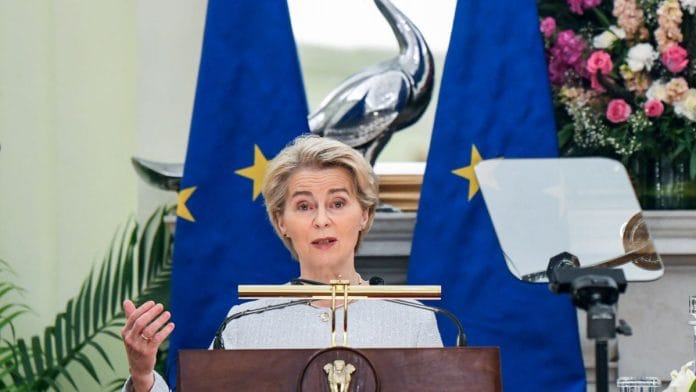New Delhi: Days before the commencement of the 30th Conference of the Parties (COP) to the United Nations Framework Convention on Climate Change (UNFCCC) in Brazil, the European Union adopted a 2040 target, while also adopting its Nationally Determined Contributions (NDC) for 2035. But climate experts are underwhelmed by the commitment, saying it is too little, too late.
“Ready for Belém! Just arrived at COP-30 with good news. The EU has just adopted its NDC for 2035. 66-72% in GHG (greenhouse gases) reduction by 2035. A milestone on our path to reaching climate neutrality by 2050. And to keep the Paris goals within reach,” President of the European Commission Ursula von der Leyen announced on X.
In negotiations between Tuesday and Wednesday, the EU agreed on a 2040 climate proposal and NDC before COP-30. It has committed towards a 90% reduction in emissions by 2040—compared to 1990—with a domestic target of 85% and up to 5% of international carbon credits.
“The next step will be the negotiations with the European Parliament. The Commission stands ready to help ensure a swift agreement while underlining the importance of maintaining the essence of the proposal,” the European Commission, the executive arm of the EU, said in a statement on Wednesday.
The statement added that the EU is headed to the upcoming climate summit with its new NDC, advanced discussions on the 2040 target, and a clear message: “Europe is staying the course and delivering on its climate commitments, at home and on the global stage.”
The EU has also committed to a target to reduce emissions by 66.25%-72.5% by 2035.
Under the European Climate Law, the EU was required to set an intermediate 2040 climate target to guide the path to climate neutrality.
This proposal had to be presented within six months of the conclusion of the first Global Stocktake of the Paris Agreement, the first of which was conducted in 2023.
“The Commission’s proposal, tabled in July 2025, is now being negotiated under the EU ordinary legislative procedure and has formed the basis for the new EU NDC,” the statement added.
EU commitment: Too little, too late?
Experts said this commitment from the EU is not enough.
In a statement, non-governmental organisation World Wildlife Fund (WWF) said that by sticking to the same range as the earlier ‘statement of intent’ (66.25%-72.5%), the EU has settled for “too little too late”.
The statement said that when a range is adopted, it is typically only the lower bound that is effectively pursued, meaning 66.25%.
“Member states are claiming they have agreed on a 90% target, but that’s just sleight of hand. Once you strip off the offsets and the potential emergency break for carbon sinks, the real figure will be lower than 85%. The EU should lead by example, not by loophole,” said Michael Sicaud-Clyet, climate policy officer at WWF EU.
Under the Paris Agreement, an ‘offset’ or ‘offsetting emissions’ allow a country to compensate for its own greenhouse gas emissions by funding a project that reduces or removes an equivalent amount of emissions elsewhere.
“Adding a review clause after five years only exacerbates the problem. It turns what should be a clear, stable path for investors and industries into a moving target. Targets are meant to set long-term direction, not to be constantly revised,” Sicaud-Clyet said.
(Edited by Viny Mishra)
Also read: Modi unlikely to attend COP-30, Environment minister Yadav to lead Indian delegation to Brazil






